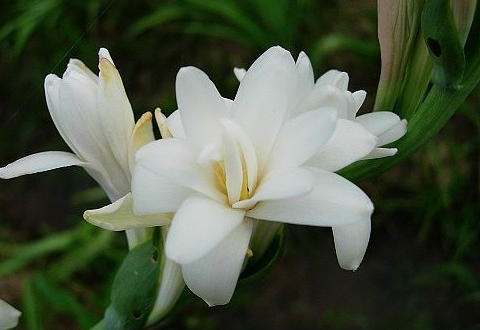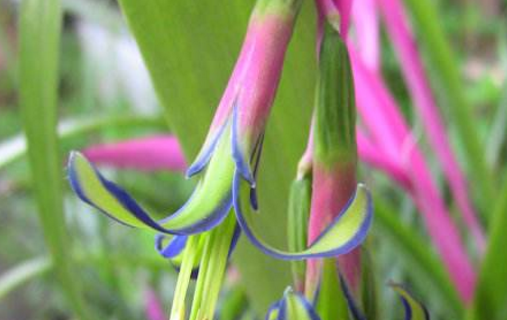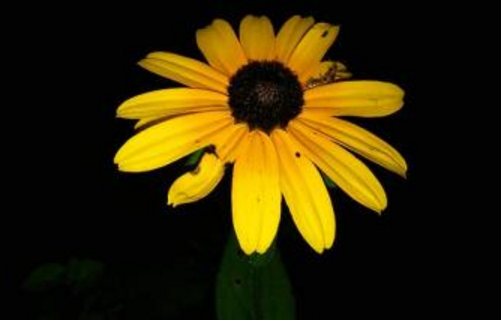Culture method of tuberose
1. Soil
The late fragrant jade is not strict with the soil, likes the rich clayey soil, and cannot accumulate water, so it is not suitable to grow in the sandy soil.

two。 Light
The evening fragrant jade likes the sufficient light, needs the regular ventilation, the summer wants to protect in the balcony, the courtyard, ensures the sunshine is sufficient.
3. Temperature
Evening fragrant jade likes a warm environment, and the suitable temperature for growth is 20-30 ℃. Flower buds begin to differentiate at the end of spring, when the lowest temperature is 20 ℃ to ensure normal plant growth.
4. Moisture content
Evening fragrant jade prefers water, but avoid stagnant water. If it is too dry, it will make the leaves curl and the buds wrinkle, making it difficult to blossom. Summer is the peak period of plant growth, which can be watered once a day to keep the soil moist.
The Culture method of Evening Xiangyu
Evening fragrant jade flowers are white and thick like jade carvings, fragrant to the nostrils, especially at night, so they are named evening fragrant jade. In the hazy summer night of the moon, the evening fragrant jade is like a young girl in silver t, light gauze, standing shyly in the flower bed, dark
Make eyes in the dark. Evening fragrant jade is a kind of flower which wins by "night incense".
Evening fragrant jade can decorate the flower border, can also be potted to watch, such as with Gladiolus made into flower baskets, bouquets or vases for indoor decoration, not only can make the house full of glory, and fragrance overflow the whole room, refreshing. If the evening jade cut flowers are planted in a solution of different colors, about 1 hour later, the white evening jade flowers will become a variety of different colors, which is interesting. In addition, its flowers can extract evening fragrant jade extract, which is an advanced cosmetic fragrance.
Evening fragrant jade, also known as night incense, is a perennial bulbous herbaceous flower of Amaryllidaceae. The underground tuber is globular, much like onion and garlic, with roots at the lower end and stems and leaves at the upper end. Leaves slender-banded, entire, alternate. Racemes terminal. The flowers are white, funnel-shaped, with strong fragrance, and the smell is stronger at night, so it is known as "night incense". It has a long flowering period and continues to bloom from June to mid-November.
The evening fragrant jade is native to Mexico. It likes sunshine and is afraid of the cold. In the tropics and subtropics, there is no dormancy period, which can blossom all the year round, while in other areas, deciduous leaves are dormant in winter. Underground tubers need to be stored indoors at about 8 degrees in the north. The demand for soil is not high, and it is resistant to salt and alkali, but it is better to have rich and loose soil.
The following formula can be used for basin soil: 7 parts of garden soil, 2 parts of rotten leaf soil, 1 part of river sand or 6 parts of peat soil, 1 part of rotten leaf soil, 2 parts of river sand and 1 part of perlite.
Winter dormancy, not cold-resistant, indoor temperature should not be lower than 5 degrees, such as room temperature is too low, cotton and other things can be wrapped around the ball.
Like the long-day environment with plenty of light. It should be placed in a sunny place and keep direct light for not less than 6 hours a day.
Like moist soil, afraid of waterlogging. Watering at the initial stage of planting and at the beginning of leaves should not be too much, and the soil should be dry to promote the growth and development of roots. When the flower stem comes out, give it enough water and fertilizer. After the flowering stops, there is no need to water it to let it dormant.
There is no need for topdressing at the initial stage of planting, and nitrogen fertilizer can be applied twice before bud extraction. At the beginning of scape, phosphorus and potassium fertilizers were applied to promote the growth of flower spikes. The compound liquid fertilizer was applied again after flowering to promote the growth and fullness of tubers.
The method of dividing balls was used to propagate. Plant small balls or sub-balls when the frost breaks at the end of spring. Soak the dry balls in cold water for half a day before planting to promote germination. Big balls and small balls should be planted separately. The small ball is a little deeper, but the big ball can be shallower. The tip of the bud can be exposed to the ground when covered with soil.
There are two reasons why the late fragrant jade only grows leaves and does not blossom: one reason is that the flower buds of the late fragrant jade have already formed on the bulbs in the first year, and if the stem is too small or clustered to develop into inflorescences, it will not blossom after planting. Another reason is that the evening fragrant jade bulbs are afraid of cold and dampness. During winter storage, such as low temperature, high humidity, frozen or moldy flower buds, they will not bloom after planting. When planting late fragrant jade, the bulbs in clusters must be divided into individual plants to grow and grow. It should be kept in a dry environment in winter, and it is better to keep it at a temperature of more than 20 workers.
The planting depth of potted late fragrant jade should grasp the principle of "deep long ball, shallow scape", that is to say, only shallow planting can promote its flowering, the usual practice is to bury the 2 canopy 3 of the bulb in the soil, or with the ball top slightly exposed to the soil surface.
The culture method of late fragrant jade the function of late fragrant jade
Evening fragrant jade is commonly known as night incense, the smell of flowers is very strong, many people like it, let's take a look at the breeding methods and the role of evening fragrant jade.
Brief introduction of Evening Xiangyu:
Evening fragrant jade, scientific name: Polianthes tuberosa, is a perennial rattan-shaped twining herb, often called night clove, night clove or night orchid and so on. Euphorbia angustifolia was originally a flowering plant in tropical America, originated in South America, and now it is also distributed in Yunnan, Guangxi, Taiwan and China. Evening fragrant jade is a perennial bulbous flowering plant of Amaryllidaceae, with massive rhizomes, weak flower branches, hairy, milky, white flowers in summer and autumn, with strong fragrance. Evening jade has the strongest fragrance when it blossoms at night, so it is called nocturnal incense. In eastern India, it is called "Ratkirani", which means "queen of the night".
The culture method of evening fragrant jade:
1. Soil: late fragrant jade is suitable to grow in fertile, well-drained sandy loam and has a certain saline-alkali tolerance.
2. Watering: late fragrant jade likes to be wet and avoid waterlogging, and grows well in places where there is low humidity without stagnant water.
3. Sunshine: the evening fragrant jade likes the sunny environment and should provide sufficient sunlight during the growth period.
4. Temperature: evening fragrant jade likes a warm environment, is not resistant to frost, and is the most suitable for growth. It is 25 ℃ 30 ℃ during the day and 20 Murray 22 ℃ at night.
5. Fertilization: late fragrant jade likes fertilizer, and topdressing fertilizer should be applied frequently, usually once after planting for one month, once before flowering, and once every one and a half months or two months thereafter.
6. Insect pests: the main pests of late fragrant jade are yellow breast thrips, North China mole cricket, yellow breast thrips, which can be sprayed with 20% permethrin EC 200 ~ 300 times.
The function of evening fragrant jade:
1. Watch
The evening fragrant jade flower is white, fragrant, especially strong at night, the flower stem is slender, the line is soft, and the planting and flowering period is easy to regulate. It is one of the very important cut flowers, and it is the main flower arrangement in the application of bouquet and flower arrangement, which plays a certain role in ornamental.
2. Medicinal use
Late fragrant jade leaves, flowers, fruits can be used as medicine, taste slightly sweet, light, cool, have the effect of clearing the liver and eyesight, pulling poison and promoting muscle, and is often used to treat carbuncle swelling.
3. Mosquito repellent
Fragrant jade in the evening will give off a strong flavor and have the effect of repelling mosquitoes.
- Prev

Culture method of pendulous water tower flower
1, temperature hi warm climate, suitable for growth temperature of 21-27° in ornamental pineapple belongs to the type of strong adaptability to temperature, tolerance of 2-5° low temperature. In South China, the plants can overwinter in the open field, but in the north, they need to be moved indoors to keep warm during overwinter, and plastic bags should be used to cover the plants when cold weather strikes.
- Next

Sowing and propagation of black-eyed Susan
The tools needed for sowing and reproduction require flowerpots, pots of soil, shovels, seeds, sprinklers and so on. The first thing you should do before sowing and propagating seeds is to select healthy black-eyed Susan seeds and save them after drying to prevent them from germinating and mildew.
Related
- Fuxing push coffee new agricultural production and marketing class: lack of small-scale processing plants
- Jujube rice field leisure farm deep ploughing Yilan for five years to create a space for organic food and play
- Nongyu Farm-A trial of organic papaya for brave women with advanced technology
- Four points for attention in the prevention and control of diseases and insect pests of edible fungi
- How to add nutrient solution to Edible Fungi
- Is there any good way to control edible fungus mites?
- Open Inoculation Technology of Edible Fungi
- Is there any clever way to use fertilizer for edible fungus in winter?
- What agents are used to kill the pathogens of edible fungi in the mushroom shed?
- Rapid drying of Edible Fungi

